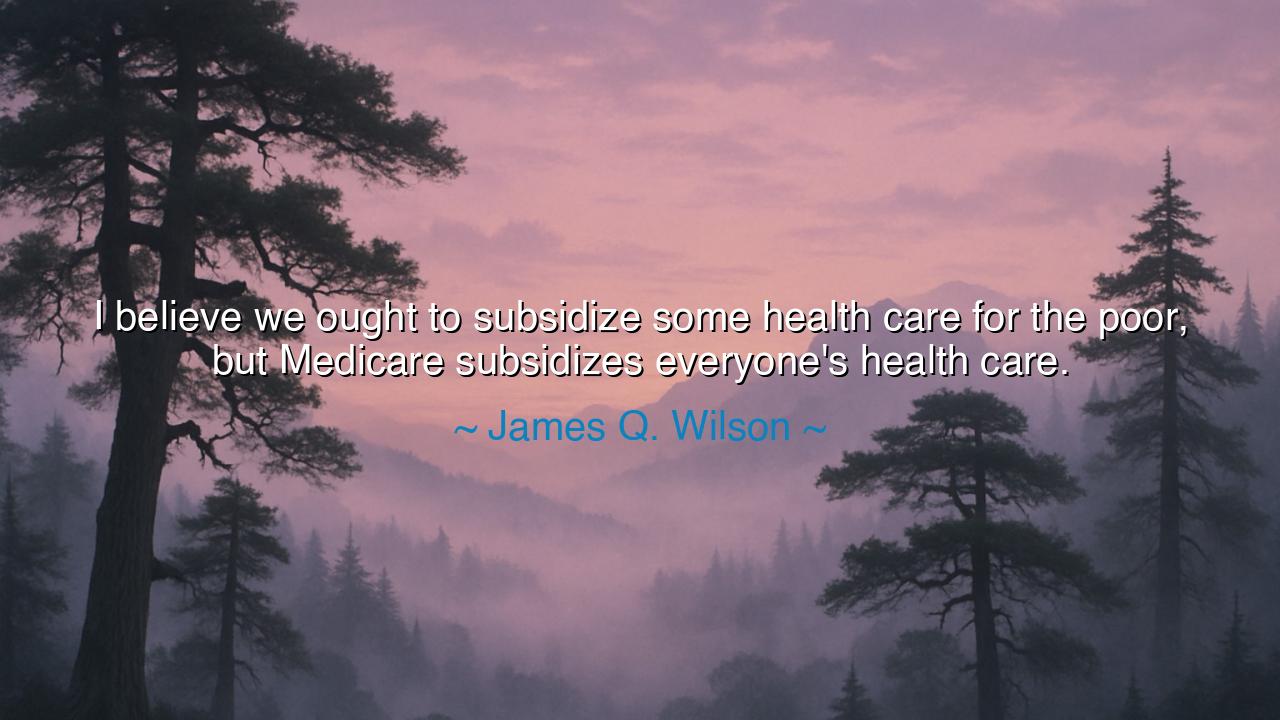
I believe we ought to subsidize some health care for the poor
I believe we ought to subsidize some health care for the poor, but Medicare subsidizes everyone's health care.






In the thoughtful and measured words of James Q. Wilson, one of America’s most distinguished political scientists, there lies a meditation not merely on policy, but on the moral design of society: “I believe we ought to subsidize some health care for the poor, but Medicare subsidizes everyone’s health care.” This statement, though framed in the language of economics and governance, speaks to something far deeper — to the eternal question of justice, responsibility, and the proper balance between compassion and prudence. Wilson, a scholar of human behavior and the public good, was not condemning generosity, but calling for wisdom in how it is given. His words ask us to look beyond good intentions and see the structure of fairness that sustains a nation’s moral and economic health.
The origin of this quote arises from Wilson’s lifelong study of government, morality, and social order. He lived in an age of expanding public programs, where the ideals of equality and care often clashed with the limits of sustainability. Medicare, a program born in the 1960s, was designed to ensure that the elderly — often the most vulnerable — would not face poverty or suffering in their later years. Yet, as the decades passed, it grew into something far broader: a system that, in Wilson’s eyes, subsidized all, not merely those in need. In this, he saw both a triumph of compassion and a danger of excess — a well-intentioned promise that risked burdening future generations and distorting the sacred balance between personal duty and public aid.
In the ancient world, the Greeks wrestled with this same question. Aristotle, in his study of ethics and politics, warned that generosity without discernment becomes waste, and that the good society must temper mercy with justice. A state that gives to all without measure risks weakening the very citizens it seeks to strengthen, for dependence grows where responsibility fades. Wilson’s observation follows this same lineage: that to care wisely is to discern where help is most needed, lest the common treasury — the lifeblood of a people’s shared strength — be drained by those who do not require it. Compassion, he reminds us, is not the enemy of discipline; it is perfected by it.
Yet, Wilson’s tone is not cold. His acknowledgment — “we ought to subsidize some health care for the poor” — reveals a heart attuned to the moral duty of civilization. No society can claim to be just if it leaves its weakest to perish. Like the ancient rulers who built granaries for famine and hospitals for the sick, he affirms that mercy must always have a place in governance. The poor, the elderly, the infirm — these are not burdens, but sacred trusts. To care for them is to reflect the divine spark of compassion that binds humanity together. But Wilson’s wisdom lies in recognizing that this duty must be targeted and sustainable, not endless and indiscriminate.
Consider the parable of Joseph in Egypt, who, foreseeing famine, stored grain during years of abundance. When the drought came, Egypt endured — not because its generosity was limitless, but because it was prepared and justly distributed. Had the grain been given freely to all in times of plenty, there would have been none left when need arose. So too must a nation husband its resources wisely, that compassion may endure not for a moment, but for generations. Wilson’s insight echoes this truth: that true stewardship is measured not by how much we give, but by how long we can sustain our giving.
In his reflection on Medicare, Wilson foresaw a growing imbalance — a system that, by seeking to serve all equally, might erode the very foundation upon which help for the truly needy depends. To him, justice meant not sameness, but equity: to give according to need, not convenience. The health of a society, he believed, depends not only on medicine and welfare, but on the moral habits of its people — their sense of duty, thrift, and care for one another beyond the state’s reach. When citizens look only to government for aid, they risk forgetting the ancient virtue of reciprocity, the understanding that a community’s strength lies as much in what its members give as in what they receive.
The lesson, then, is one of balance — the eternal dance between heart and reason. Help those who truly cannot help themselves, and do so gladly; but let not generosity become indulgence, nor compassion become dependency. Build systems that protect, but also empower; that offer relief, but also inspire responsibility. In your own life, practice this wisdom: give with discernment, work with diligence, and care for others in ways that lift them to their own strength. For mercy without measure, though radiant, soon fades; but mercy guided by wisdom endures like the sun, steady and life-giving.
So, children of policy and compassion, remember the teaching of James Q. Wilson: that good governance is not merely about spending, but about sustaining; not merely about helping, but about healing. A society that gives blindly may exhaust its wealth, but a society that gives wisely preserves its soul. Let your mercy be guided by prudence, your charity by foresight, and your heart by both love and reason. For only in that harmony — where justice and compassion meet — does the light of true civilization endure.






AAdministratorAdministrator
Welcome, honored guests. Please leave a comment, we will respond soon